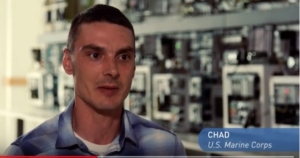Soldier On: Initiative Puts Service Vets on Frontline of Manufacturing Skills Revolution
After years of decline, the U.S. manufacturing sector is in the midst of a pivotal transformation. Adoption of emerging technologies including artificial intelligence, robotics, additive manufacturing, and the Internet of Things, are bringing levels of innovation and productivity that are inspiring not only U.S.-based companies to “reshore” manufacturing, but prompting a flurry of foreign direct investment in the region as well. It’s all good in the hood, except for one minor detail – there aren’t enough workers with the skill level necessary to support this manufacturing revolution.
Commercial and academic research, as well as anecdotal evidence (Factory CEOs tell Trump: Jobs exist, skilled applicants don’t), all indicate that manufacturers are already having difficulty finding “rightly-skilled” candidates. This challenge is expected to be compounded in the coming years as an imperfect storm of circumstances converge: including the proliferation of advanced technologies in manufacturing, baby boomers retiring, swelling demand due to increased commitments to U.S.-based manufacturing by both U.S. and foreign-based corporations and a paucity of young adults pursuing factory jobs.
Recognizing that this skills shortage could derail the manufacturing renaissance that is so vital to the future of both their businesses and the U.S. economy, Jonas Prising, CEO of ManpowerGroup and Blake Moret, CEO of Rockwell Automation, announced a joint initiative this summer which aims to rally the troops, both literally and figuratively, in support of the U.S.’s long-anticipated advanced manufacturing revolution.
The initiative targets a community that knows a thing or two about battling through adversity – U.S. military service veterans. Leveraging Rockwell’s highly respected Engineer-in-Training (EIT) program and ManpowerGroup’s expertise in workforce solutions, the companies aim to train up to 1,000 veterans per year by 2018 in the newly created Academy of Advanced Manufacturing.

Chad, U.S. Marine Corps: “When I first got out, I was looking at the job boards and I saw a lot of jobs out there for automation, manufacturing, electrical, electronics kind of stuff and I thought, OK, I have the electronics experience, but I don’t know anything about PLCs or HMIs or any of this other stuff at all.”
Veterans, according to the ManpowerGroup research report, Veterans: A Force to be Reckoned With, are a consistently underutilized source of talent. It is estimated that approximately 200,000 soldiers retire from active duty military service every year, and many struggle to find suitable employment after their service career ends. Some encounter cultural bias among potential employers – i.e., those who are “anti-military” or worry that PTSD will be an issue. Others have difficulty trying to relate the duties they performed in service to the requirements of a particular position.
“These recruiters and HR people too often fail to see that many veterans are tailor made for positions in the ‘factory of the future,’” said Joe Allie, business manager, global competency, Rockwell Automation. “Not only do former soldiers more commonly demonstrate the skill sets cited as essential for the workforce of the future – such as problem solving, teamwork and critical thinking skills – but their background in roles like nuclear engineering, avionics and weaponry systems give them the kind of experience with high-tech machinery that customers say they need,” he noted.
Yet, veterans frequently relate that when they leave the service, they get career advice that steers them toward jobs that are not leveraging the technical expertise and experience they have, which makes them feel frustrated and trapped, explained Rebekah Kowalski, vice president, Client Workforce Solutions, ManpowerGroup. “This program will take them back to what they are most passionate about and connect them directly with employers who have openings for well-paying jobs.”
Individuals who are accepted into the program, which is available at no cost to participants, are embedded on the Rockwell Automation campus in Mayfield Heights, Ohio, for ten weeks of intensive classroom and hands-on lab training. The program is designed to offer both technology instruction as well as guidance on the “soft skills” these veterans need to translate their military service experience into sustainable employment in advanced manufacturing. Rockwell is also building a lab space on its Milwaukee campus so the program will be able to accommodate even more individuals.

Travis, U.S. Navy: “It’s taken a toll on me emotionally because I went from this guy who has traveled the world, and then I felt like I was nothing to anybody. I started looking for jobs and people were confused as to what I wanted from my resume, so I had to start from scratch. When I got contacted for this, I was really excited. This program seems like it was made just for me.”
For now, the program will focus on skills related to instrumentation and automation controls – functions that are increasingly vital across a range of industry sectors, including durable goods, food processing, paper processing and automotive, according to research conducted jointly by ManpowerGroup and Rockwell Automation. “I have yet to talk to a manufacturing organization that doesn’t leverage this role,” said Kowalski.
Unlike Rockwell’s EIT program, which is obviously geared to train technicians specifically on Rockwell Automation equipment, the veterans’ program will be vendor agnostic wherever possible, Allie noted. “We are training people for the manufacturing sector. So, regardless of the provider of the automation equipment on a given factory floor, the individuals will have the base skills and capability necessary to go into just about any manufacturing facility and be effective from day one.”
Though grateful for the opportunity, many potential participants have asked Kowalski why the companies are making such a big investment in the program. “It seems too good to be true to them, but I just explain that we see that this is a pervasive shortage and, as an industry, we all share the responsibility to do the hard work to ensure the resiliency of our workforce,” she said. “At the same time, I have to say, in my seventeen years with ManpowerGroup, I have never been more proud of a program. We are honoring our values and changing lives.”
Rockwell’s Allie echoed this sentiment: “This is about the neatest thing we could imagine working on. It feels right, and it is exciting to be a part of it.”
As the program matures, the companies hope to eventually extend it to provide ongoing training for its participants. “We want to be able to support these people through their career journey,” Kowalski concluded. “We need to look at our workforce as a sustainable resource. We want them to keep learning and growing.”
